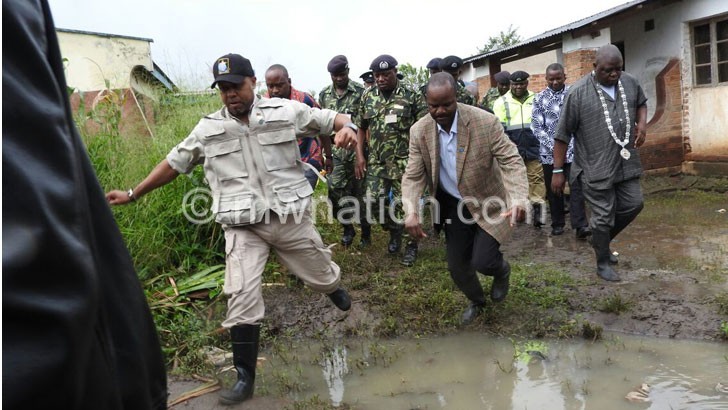‘USA has given Malawi $55 million for disaster’
Following President Peter Mutharika’s declaration of the State of National Disaster early this week, CHACHACHA MUNTHALI asks Vice-President DR SAULOS CHILIMA if enough has been done to respond to disasters.
Government last year took out a $30 million insurance policy as cover against drought in the event of El Nino hitting Malawi for the 2015-2016 farming season. When is it supposed to pay out, as it has become evident that Malawi has started feeling the effects?

First of all, let me say that the overall objective of the drought insurance policy from the African Risk Capacity (ARC) Insurance Company is to provide immediate funds to the Government of Malawi for implementing a drought emergency response programme. These funds will bridge the gap between ‘the end of a failed season and the time when emergency support starts coming in’ from donors. This will ensure that affected households are provided with humanitarian relief assistance quickly before the disaster victims engage in destructive coping mechanisms, which include selling productive assets. The ARC, as the insurer, uses a model called Africa Risk View which uses satellite rainfall data to monitor the performance of the rainfall season. However, a decision as to whether Malawi will get a pay-out or not will be known at the end of the rainfall season.
Will the payout be sufficient to mitigate the effects of the drought until the next cycle of harvest?
Much as the payout will depend on the type of data as monitored by the Africa Risk View, it is unlikely that the payout can be sufficient in view of the likely impact of the prolonged dry spells. Government will still require support from well-wishers both within and outside Malawi to assist the affected households in addition to resources that will be allocated by government. Meanwhile, the Malawi Vulnerability Assessment Committee (MVAC) will conduct a rapid assessment exercise to determine the magnitude of the drought which will give us a clear picture on how many people will require assistance.
Following President Peter Mutharika’s declaration of State of National Disaster, how much is government expecting in donations to cushion Malawians against the worst effects of hunger between June this year and March next year?
The Ministry of Agriculture, Irrigation and Water Development has estimated that the country will have a maize deficit of about 1 072 461MT. However, the actual deficit will be ascertained after the third round production estimates in June 2016, whose results will form a basis to compute a comprehensive national food balance sheet. The ministry has also estimated that due to the partial or complete loss of crops through El Nino induced dry spells, the affected population will require about 790 000MT of relief food. Government is, therefore, expecting donations to meet this food relief requirement. However, for the country to avert further food crisis, it will require 1 290 000 MT. The actual number of food insecure people will be determined by MVAC in due course when the annual vulnerability assessment is undertaken.
Has government received any pledges of funding since the announcement was made?
Following the President’s declaration, the government of the United States of America has been the first to respond and has provided the Malawi Government with $55 million. This speedy response from Washington gives us confidence that more assistance will come from the donor community, international partners, the private sector, organisations and individuals.
This is the second year in a row that Malawi has called a State of National Disaster, which puts into perspective the country’s general state of preparedness. What mechanisms has government put in place to ensure it is well-prepared for such eventualities in future?
In order to properly manage hazards and reduce their impacts on lives, livelihoods, health, assets and the socio-economic development of the country, the government has recognised the critical role that disaster risk management and climate change adaptation have to play in the short, medium and long-term. So far, the Cabinet has approved the National Disaster Risk Management (NDRM) Policy whose goal is: to sustainably reduce disaster losses in lives and in the social, economic and environmental assets of communities and of the nation. The vision of the NDRM Policy is ‘a nation resilient to disasters.’ Further to that there is need to break the cycle of disasters. In this regard, we are coming up with a three pronged strategy. This is a five-year agenda aimed at building national resilience to disasters and breaking the current cycle in which disasters are an annual event affecting a lot of Malawians. The plan is covering afforestation to reduce occurrence of floods and droughts as well as control water flow, construction of dykes, dams and river training to mitigate impacts of floods and irrigation for food security, nutrition and export growth. Through the plan, government is harnessing efforts to pool resources from private sector, government and development partners and also clearly track progress in a coordinated manner.
Following your visit to Mzuzu on Tuesday to assess the damage caused by rain last week, how is government mobilising resources to assist the victims?
We will engage Treasury to ensure that funding is provided to the Department of Disaster Management Affairs so that relief assistance should continue being provided to the affected people.
You suggested in Mzuzu that affected people should relocate, but aware of the challenges similar pleas have faced in other parts of the country such as the Lower Shire, how would government go about to ensure the people in Mzuzu heed the advice?
Government will continue sensitising people about the dangers of settling in risky disaster prone areas. We will, therefore, work with the Mzuzu City Council, parliamentarians, and local leaders to ensure that people staying in such areas adhere to the advice to relocate to safer areas.





